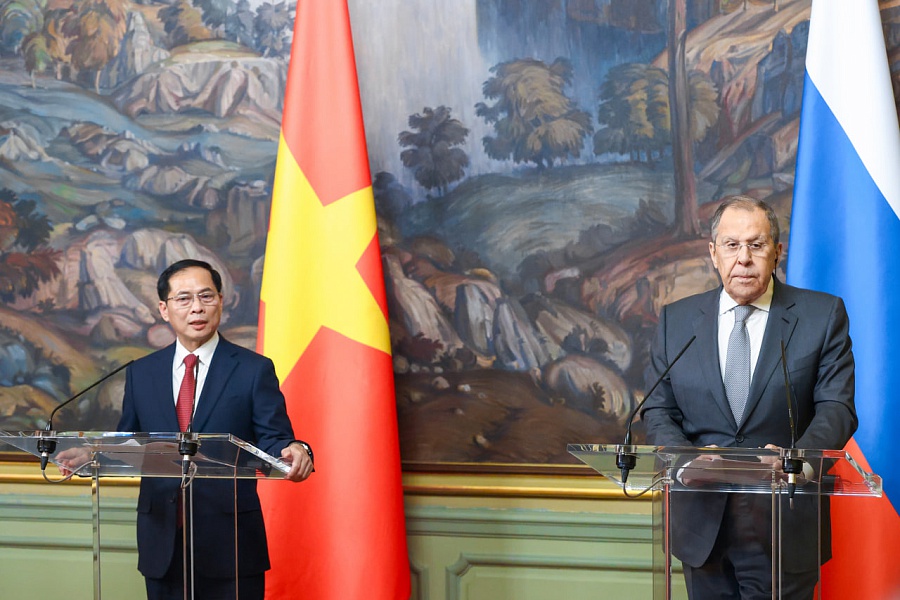Foreign Minister Sergey Lavrov’s statement and answers to media questions at a joint news conference following talks with Deputy Prime Minister - Foreign Minister of the Socialist Republic of Vietnam Bui Thanh Son
Ladies and gentlemen,
The negotiations with Deputy Prime Minister - Foreign Minister of the Socialist Republic of Vietnam Bui Thanh Son have concluded. Following the tradition, they were grounded in mutual trust, and were held in a warm, friendly, and constructive atmosphere.
We reviewed a wide range of issues, including our plans for holding top- and high-level contacts this year in connection with major anniversaries, among other things. Primarily, it’s the 75th anniversary of diplomatic relations between our countries, the 80th anniversary of Victory in the Great Patriotic War and World War II, the 80th anniversary of Vietnam’s independence, and the 50th anniversary of liberation of South Vietnam. All these memorable dates will be marked by special events attended by representatives of the leadership of the Russian Federation and the Republic of Vietnam. We attach particular importance to the participation of General Secretary of the Central Committee of the Communist Party of Vietnam Comrade To Lam in the celebrations marking the Great Victory Day in May in Moscow.
Comrade To Lam will use this occasion to make a state visit to the Russian Federation. We discussed preparations for this visit today. We are looking to offer an interesting programme for this visit and to have a major package of documents effectively agreed upon and signed. They will come as a substantial addition to the legal and contractual basis of our relations.
We discussed a range of practical bilateral issues arising from the previous agreements of our respective leaders, including the agreements reached during President Vladimir Putin’s visit to Vietnam in June 2024. We are interested in seeing these excellent relations based on the long-standing traditions of friendship, solidarity, combat brotherhood, and our deep political dialogue ensure the progressive expansion of our cooperation across all areas for the benefit of the peoples of our countries.
We looked into our trade and economic ties and emphasised the importance of adapting them to modern realities. We noted that our joint efforts have led to a sizable growth of bilateral trade by more than 20 percent to $5.95 billion in 2024. However, we can do more. There is the potential to increase the supply of Russian-made products to the Vietnamese market that we agreed to actively explore.
We confirmed our mutual willingness to facilitate the implementation of joint oil and gas projects in Russia and the continental shelf of Vietnam with the participation of Zarubezhneft and Petrovietnam Corporation. We agreed to promote new areas of cooperation in the fuel and energy sector, including oil and LNG supplies, and the construction of LNG terminals and wind power plants in Vietnam. All of the above will be further discussed by the relevant economic operators.
The Vietnamese leadership has decided to develop the national nuclear power industry. Rosatom State Corporation will be ready to step up and to engage in the construction of the Ninh Thuan 1 NPP.
We are interested in expanding cooperation to ensure comfortable and efficient bank payments that have been stymied by illegal Western sanctions of the past several years. Work to shield our economic financial ties from the harmful impact of such illegal restrictions is underway. Today, we agreed to speed it up so that no one attempts to question, let alone undermine, Russia and Vietnam’s legitimate rights to expand cooperation in accordance with existing agreements and in full compliance with international law.
We aim to continue expanding defence and security cooperation. We welcome our Vietnamese friends’ initiative to hold the ceremony for signing the first ever legally binding international information security instrument on their territory. I’m referring to the UN Convention against Cybercrime, which was spearheaded by the Russian Federation. The convention was successfully finalised during the UN General Assembly’ last session in late 2024. Vietnam, with its high standing in matters of international cooperation, was supported in its bid to have this convention signed in Hanoi. The signing will take place in the autumn of 2025. We will gladly participate in this event at the invitation of our Vietnamese friends.
We highly appreciate the long-standing cooperation in scientific research, education, and professional training. We consider it important to implement a project to establish a Centre for Nuclear Science and Technology in Vietnam, and to ensure stable operation of the Joint Russian-Vietnamese Tropical Research and Technology Centre. Russia is getting ready to donate a research vessel to the centre for it to participate in its programmes.
Vietnamese citizens are studying at Russian universities, which we welcome. Interest in getting education in our country and in the Russian language in general is high. For the current academic year, we have allocated 1,000 scholarships funded from the federal budget for Vietnamese students. All of these scholarships are being used. Work is underway to create a Russian school in Hanoi. We plan to form a regional centre for the study of the Russian language in Southeast Asia at the existing Pushkin Institute of Russian Language in Hanoi. This will mark an important step in expanding our ties with Vietnam and, more broadly, ASEAN.
We noted expanded opportunities for tourism and other exchanges following the resumption of direct air service between our countries. We discussed the possibility of expanding the geography of flights and increasing the frequency of direct flights which will intensify various kinds of ties ranging from tourism to the economy.
We agreed to enhance cooperation in the media sphere, including measures to strengthen the informational dimension of the Russia-Vietnam comprehensive strategic partnership, ensure our citizens receive truthful information, and counter disinformation regularly disseminated by certain Western counterparts – including narratives pertaining to our collaboration with our Vietnamese friends.
We acknowledged the alignment or convergence of our approaches on the majority of pressing global issues. This serves as a robust foundation for close, coordinated engagement across multilateral platforms, particularly within the UN and ASEAN. Priority attention is accorded to the Asia-Pacific Region. We advocate the establishment of an equal and indivisible security architecture in this region, one that aligns with contemporary realities and is grounded in universally recognised norms of international law. In this context, we are deeply concerned by the counterproductive attempts to forge a network of narrow bloc-based alliances.
We welcome Vietnam’s readiness to comprehensively facilitate the advancement of dialogue partnership ties between Russia and ASEAN. The 35th anniversary of our dialogue partnership with ASEAN will be marked in 2026. I am confident that we, together with our Vietnamese friends and other members of the Association of Southeast Asian Nations, will commemorate this milestone in a fitting manner.
In discussions on international affairs, we reaffirmed our appreciation for the consistent, balanced, and objective position held by our Vietnamese partners regarding the root causes of the Ukrainian crisis and its evolving dynamics at the present stage.
We provided detailed information on our approaches to the current situation. We will continue to pursue conflict resolution predicated on the imperative of eliminating the underlying causes of its emergence – or rather, the root causes of its deliberate orchestration by the Western sponsors of the Kiev regime, which came to power through an anti-constitutional coup d’état.
We hold these talks in high regard. I express gratitude to my friend for our collaborative efforts.
Question: This year marks the 10th anniversary of the signing of the free trade agreement between Vietnam and the Eurasian Economic Union. What benefits do you see in this integration, and how will citizens of our countries gain from it?
Sergey Lavrov: The advantages are universal, encompassing both Vietnam and all EAEU member states. This is evidenced by statistics demonstrating growth in trade turnover. The union operates on principles of equality and mutual benefit.
This stands in stark contrast to the tariff wars currently unfolding between the United States and nearly all its partners, including the European Union, alongside the blatant and crude abuse of reserve currency dominance. These developments necessitate the pursuit of alternative mechanisms to sustain economic cooperation through the banking and financial systems, amid unlawful unilateral restrictions – tools the West has weaponised as its sole negotiating tactic on trade and economic matters.
None of these issues exist within the Eurasian Economic Union, which is founded on strong principles of mutual benefit, mutual respect, and the pursuit of balanced interests. The EAEU and its partners maintain institutional ties with ASEAN. The EAEU itself, alongside ASEAN, the SCO, and other Eurasian entities, is fostering inter-organisational cooperation by leveraging inherent geographical and logistical advantages bestowed by history and providence. As the world’s largest and most resource-rich continent, Eurasia has a vested interest in ensuring that its nations – and they alone – reap the benefits of natural resource development and infrastructure projects. This forms the bedrock of what we term the Greater Eurasian Partnership, which, when extended to security matters, serves as the tangible foundation for a continent-wide security architecture – a point the Minister emphasised earlier.
These are natural processes, part of the objective historical evolution towards a multipolar world. Within this framework, ASEAN, the EAEU with its free trade zone partners, the SCO, and other Eurasian structures will undoubtedly emerge as pivotal poles. This process is ongoing, far from complete, yet already irreversible.
Question: In the context of strengthening Russia-Vietnam energy cooperation, what potential do both sides see for collaboration in the field of peaceful nuclear energy?
Sergey Lavrov: I referenced this in my opening remarks. We are currently advancing a project to establish a Nuclear Science and Technology Centre in Vietnam, which we hope will proceed swiftly. The Rosatom State Corporation has successfully implemented such centres in multiple partner nations. These facilities have proven highly effective, particularly in advancing nuclear medicine and non-energy nuclear applications in agriculture. This initiative holds significant promise for Vietnam’s technological development. Recently, the Vietnamese government resolved to expand its nuclear energy sector, including plans to construct the first Ninh Thuan 1 Nuclear Power Plant.
Rosatom, as a corporation with unparalleled expertise not only in constructing reactor units and nuclear power plants but also in establishing entire industrial ecosystems around them, anticipates the opportunity to compete for the contract to build this critical facility for Vietnam.






